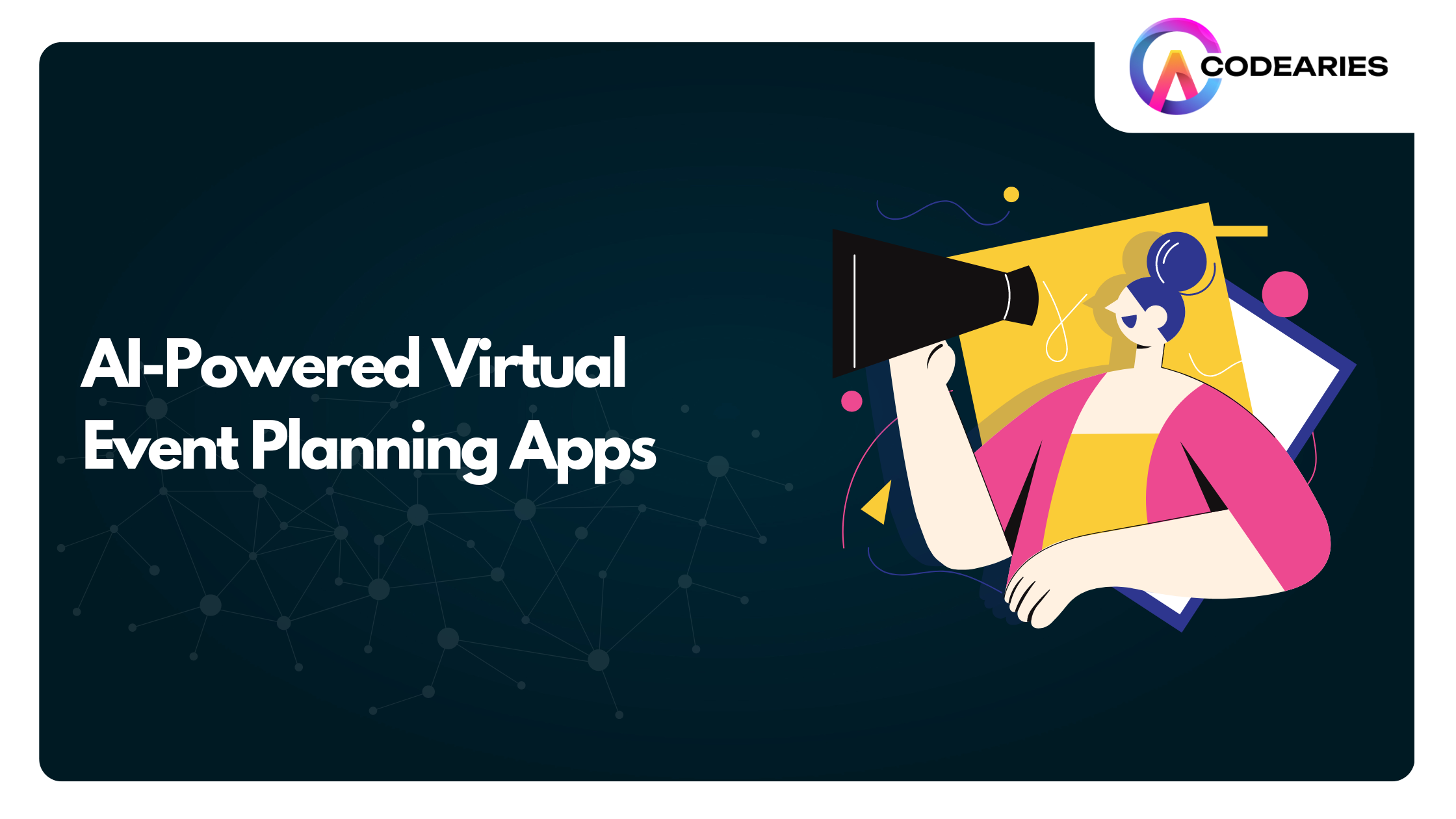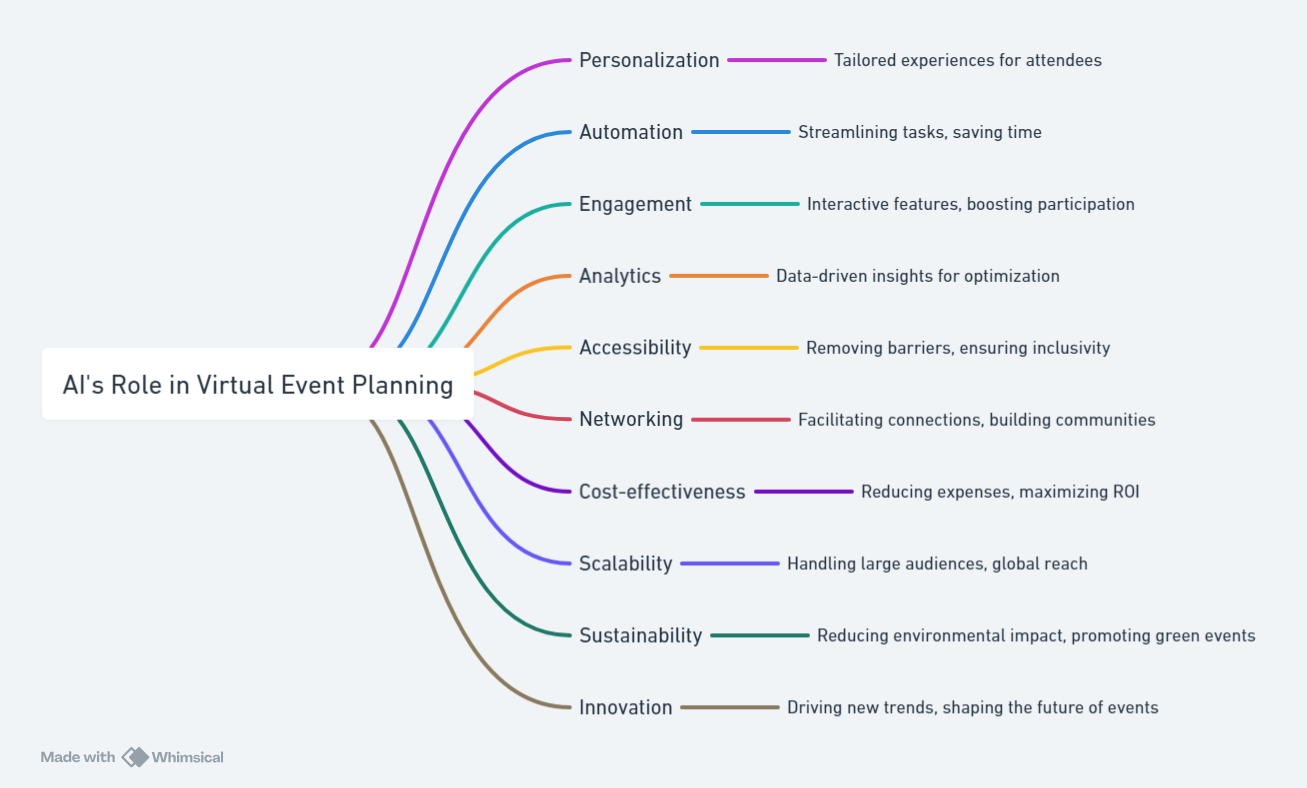
Artificial Intelligence (AI) is no longer a buzzword confined to sci-fi movies. It’s a tangible, transformative technology reshaping industries, including event planning. AI-powered virtual event planning apps are revolutionizing how events are organized, delivered, and experienced. From simplifying the logistics of event management to creating personalized attendee experiences, these apps are emerging as indispensable tools for organizers worldwide.
Let’s dive deep into how AI-powered apps are impacting virtual events, the key features to look for, and the future of this promising technology.
How AI is Transforming Event Planning
In today’s fast-paced environment, event planners must maximize efficiency while working with limited time and resources. Artificial intelligence (AI) is revolutionizing this process, especially for virtual events where complexities can increase. By integrating AI into event planning applications, organizers can automate repetitive tasks, analyze real-time data, and customize attendee experiences.AI empowers planners with tools for intelligent scheduling, automated communication, and predictive analytics that estimate attendee numbers and engagement. These innovations reduce human error and enhance efficiency, allowing organizations to save both time and money. Ultimately, AI is becoming an essential asset for navigating the challenges of modern event management.
The Role of AI in Virtual Event Planning
The Global AI in Event Management Market size is expected to be worth around USD 14.2 Billion By 2033, from USD 1.8 Billion in 2023, growing at a CAGR of 22.9% during the forecast period from 2024 to 2033. AI plays a crucial role in virtual event planning, significantly enhancing data management, audience engagement, and content delivery. With AI-powered tools, planners can analyze large volumes of data in real time, enabling them to make adjustments and optimize the event as it progresses. Predictive analytics further enhance this capability by estimating attendee numbers, identifying peak engagement periods, and determining the most effective ways to deliver content. Moreover, AI is essential for fostering audience interaction. By employing AI-driven chatbots and conducting real-time surveys, event organizers can connect with attendees on a personal level. These tools allow for immediate responses to questions, the collection of valuable feedback, and the flexibility to make necessary changes during the event. This integration of AI not only streamlines the planning process but also enriches the overall attendee experience.
Moreover, AI is essential for fostering audience interaction. By employing AI-driven chatbots and conducting real-time surveys, event organizers can connect with attendees on a personal level. These tools allow for immediate responses to questions, the collection of valuable feedback, and the flexibility to make necessary changes during the event. This integration of AI not only streamlines the planning process but also enriches the overall attendee experience.
Why Businesses Prefer AI-Powered Event Planning Tools
Many businesses are turning to AI-powered event planning tools because of the undeniable benefits they offer:
Efficiency and Automation
- Time Savings: AI automates repetitive tasks like sending invitations and managing registrations, allowing planners to focus on strategic work.
- Error Reduction: By minimizing human errors in data entry and scheduling, AI ensures greater accuracy.
Data-Driven Insights
- Audience Analysis: AI analyzes attendee data to reveal trends and preferences, enabling tailored events.
- Predictive Analytics: AI forecasts attendance and ticket sales, helping businesses optimize their strategies.
Personalized Experiences
- Custom Recommendations: AI suggests personalized itineraries based on attendee interests.
- Targeted Communication: AI delivers tailored messages, enhancing engagement and satisfaction.
Cost-Effectiveness
- Resource Optimization: AI helps allocate resources efficiently, reducing costs and maximizing ROI.
- Scalability: AI tools can manage events of any size without significant additional costs.
Improved Decision-Making
- Insightful Analytics: AI provides actionable data to inform better decision-making.
- Risk Mitigation: AI identifies potential risks, allowing proactive measures.
In essence, AI-driven event planning tools boost efficiency, offer valuable insights, enhance personalization, cut costs, and improve decision-making, making them invaluable in the evolving landscape of event management.
The Integration of AI and VR in Event Planning
Virtual Reality (VR) is another technology that is making waves in the event industry, especially when combined with AI. Together, they create immersive, interactive experiences that transcend traditional event formats. VR can replicate the experience of physical attendance, while AI fine-tunes the attendee experience by providing personalized recommendations and insights.
Examples of AI and VR in Event Planning:
- Virtual Conferences: Entire conferences can be held in VR, with attendees attending sessions, networking, and exploring virtual exhibits.
- Product Launches: VR can be used to create immersive product launch experiences, allowing attendees to interact with products in a virtual environment.
- Training and Development: VR can be used for training and development events, providing hands-on simulations and interactive learning experiences.
Transforming Virtual Event Marketing with AI
Artificial Intelligence (AI) is revolutionizing virtual event marketing by enhancing engagement, streamlining processes, and optimizing outcomes. By leveraging AI technology, event organizers can create impactful and memorable experiences for attendees.
Key Applications of AI in Virtual Event Marketing
Personalized Marketing:
- Smart Segmentation: AI analyzes attendee data for targeted email campaigns that resonate.
- Dynamic Content: AI platforms generate adaptive content based on user interactions.
Chatbot Engagement:
- 24/7 Support: AI chatbots provide instant assistance, ensuring a smooth experience.
- Tailored Recommendations: Chatbots suggest relevant content and networking opportunities.
Intelligent Networking:
- Smart Matchmaking: AI connects attendees with similar interests for meaningful interactions.
- Engagement Metrics: AI tracks attendee engagement to inform future event planning.
Accessibility Features:
- Real-Time Translation: AI tools offer translation services, making events accessible to a global audience.
- Inclusive Options: AI enhances accessibility with closed captioning and screen reader compatibility.
Notable AI-Powered Tools
- Eventbrite: Enhances attendee experiences through personalization and optimization.
- Hubilo: Offers features like attendee matchmaking and engagement analytics.
- Zoom Events: Provides AI functionalities like automated transcriptions and personalized recommendations.
By adopting AI in virtual event marketing, organizers can foster immersive, personalized experiences that engage attendees and drive success.
How Machine Learning Optimizes Event Management
Machine Learning (ML) is revolutionizing event management by enabling data-driven insights and predictive analytics that enhance planning, execution, and analysis. It predicts attendance and optimizes capacity by analyzing historical data, allowing organizers to select the right venues and allocate resources effectively. ML personalizes attendee experiences through tailored recommendations and dynamic content adjustments. By conducting real-time sentiment analysis on feedback, ML helps organizers make immediate improvements to enhance satisfaction. Additionally, it aids in risk management by identifying potential challenges and simulating various scenarios for informed decision-making. After events, ML continues to deliver value by analyzing data to measure performance, ROI, and areas for continuous improvement.
How AI Enhances Collaboration for Event Planners
AI enhances collaboration for event planners by providing tools that streamline communication, improve decision-making, and foster teamwork. AI-powered platforms can automate tasks like scheduling meetings, assigning responsibilities, and tracking progress, freeing up planners’ time to focus on strategic planning and creative collaboration. Additionally, AI can analyze data from previous events to identify successful strategies and areas for improvement, facilitating informed decision-making among team members. By breaking down communication barriers and providing a centralized platform for collaboration, AI empowers event planners to work more efficiently and effectively together.
Transforming Virtual Events: Inspiring AI Success Stories
AI technology has revolutionized the virtual event landscape, empowering organizers to deliver more engaging and personalized experiences. Here are several notable case studies showcasing how major brands have effectively harnessed AI for their virtual events:
HubSpot’s INBOUND Conference
At HubSpot’s INBOUND conference, AI-driven networking tools were implemented to match attendees based on shared interests and professional backgrounds, facilitating genuine connections. Additionally, AI played a crucial role in delivering personalized content recommendations, ensuring that attendees received information on sessions and workshops tailored to their specific needs.
Salesforce’s Dreamforce
Salesforce’s Dreamforce event utilized AI to enhance attendee engagement by analyzing behavior and participation levels in real time. This allowed organizers to make necessary adjustments to keep participants engaged. Furthermore, AI-powered virtual tours of the Salesforce Tower offered attendees the chance to explore the venue and interact with exhibits from the comfort of their homes.
Google Cloud Next
Google Cloud Next leveraged AI for real-time translation and captioning, making the event accessible to a global audience. By utilizing AI algorithms, they provided personalized session recommendations based on attendees’ interests and past behaviors, enhancing the overall experience and relevance of the content.
Final Thoughts on AI-Powered Virtual Event Planning Apps
AI-powered virtual event planning apps are changing the way the event industry operates, offering a smarter, more efficient way to plan, manage, and execute events. From enhanced personalization to predictive analytics, AI brings a wealth of opportunities for both event planners and attendees. As AI technology continues to evolve, the future of event planning looks more innovative, immersive, and inclusive than ever.
FAQs
How to Use ChatGPT for Events
ChatGPT can enhance event management in several ways. It can assist with event promotion by generating engaging content for social media, email invitations, and event descriptions to capture the audience’s attention. As a chatbot on event websites, ChatGPT provides real-time answers to attendee questions and helps with registration, ensuring timely support.Additionally, it streamlines content creation by quickly drafting agendas, speaker bios, and other materials. After the event, ChatGPT can help gather insights by creating surveys or feedback forms to collect attendee experiences, which is valuable for improving future events.
How AI is Used in Scheduling
AI optimizes scheduling processes significantly. Automated scheduling tools use AI algorithms to analyze calendars and preferences, proposing optimal meeting times while reducing conflicts. AI can identify scheduling issues by cross-referencing participants’ calendars and suggesting alternatives.Moreover, AI aids in resource management by recommending appropriate venues and equipment based on attendance patterns. Some AI systems even learn from historical data to enhance scheduling accuracy over time, taking into account factors like travel time and participant availability.
What is AI-Powered Automation?
AI-powered automation utilizes artificial intelligence to automate tasks that typically require human intervention. In events, this includes streamlining attendee registration and ticketing, enabling real-time updates without manual input. AI also facilitates personalized communications by sending tailored emails based on attendee behavior.Additionally, AI can analyze feedback and engagement metrics automatically, providing insights for future planning. It can also assist with task management by organizing and delegating responsibilities based on team members’ workloads and expertise.
Is AI Good for Forecasting?
Yes, AI is highly effective for forecasting, especially in event planning. It employs predictive analytics to analyze historical data and identify patterns, allowing organizers to forecast attendance, budget needs, and resource requirements accurately. AI can also track industry trends and external factors to assess potential impacts on attendance.Furthermore, machine learning models improve accuracy over time by learning from new data. AI can simulate different scenarios, helping organizers prepare for various possibilities and make informed decisions based on forecasted outcomes. Overall, AI enhances forecasting accuracy and supports data-driven decision-making for successful event planning.


